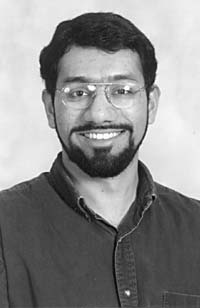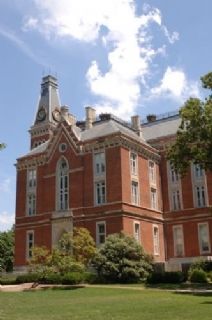Prof. Anas Malik Addresses 'Islam in America' Conference
July 18, 2002
 July 18, 2002, Greencastle, Ind. - "Anas Malik, from DePauw University, elaborated on the dominance of media by corporate powerhouses like AOL TimeWarner, CNN, ABC News and CBS," stated an article distributed by Islam Online summarizing the Islamic Society of North America's “Islam in America” conference. Dr. Malik, director of DePauw's Quantitative Reasoning Center and assistant professor of political science, was among the speakers at the conference, which took place July 5-7 in Rosemont, Illinois.
July 18, 2002, Greencastle, Ind. - "Anas Malik, from DePauw University, elaborated on the dominance of media by corporate powerhouses like AOL TimeWarner, CNN, ABC News and CBS," stated an article distributed by Islam Online summarizing the Islamic Society of North America's “Islam in America” conference. Dr. Malik, director of DePauw's Quantitative Reasoning Center and assistant professor of political science, was among the speakers at the conference, which took place July 5-7 in Rosemont, Illinois.
Among the topics discussed was the impact media messages can have on the way Americans view Islam and Muslims. “By setting agendas, framing issues, and defining language and discourse, the corporate mass media establishes the terms and scope of policy debates,” Malik told the gathering. The article adds that the DePauw professor "argued that while media outlets like IslamOnline and others are a good start, they are not an end in themselves." Dr. Malik said, “Muslims need to invest heavily in long term, strategic public relations efforts to have an impact on the corporate mass media.”
In his July 6th presentation, entitled "Corporate Mass Media and Portrayals of Muslims: Some Considerations Related to Structure, Language and Strategies for Change," the article notes that "Malik also stressed the importance of 'flak' campaigns, which refer to negative responses to media reports, involving letters, phone calls, petitions, speeches, legal and parliamentary action, and  other forms of complaint. He said that even though it is unclear as to how many people participate in CAIR'S [Council on American-Islamic Relations] Action Alerts, they nevertheless serve an important purpose in mobilizing the community." The CAIR works to help people of all faiths understand Islamic beliefs and the positive roles Muslims play in American society.
other forms of complaint. He said that even though it is unclear as to how many people participate in CAIR'S [Council on American-Islamic Relations] Action Alerts, they nevertheless serve an important purpose in mobilizing the community." The CAIR works to help people of all faiths understand Islamic beliefs and the positive roles Muslims play in American society.
You can read the Islam Online story in its entirety by clicking here. A complete program of the conference, which was sponsored by the Islamic Society of North America and the Association of Muslim Social Scientists, is available here. You can learn more about the Council on American-Islamic Relations here.
Back